
The unification of Italy, also known as the Risorgimento, was the 19th-century political and social movement that in 1861 resulted in the consolidation of various states of the Italian Peninsula and its outlying isles into a single state, the Kingdom of Italy. Inspired by the rebellions in the 1820s and 1830s against the outcome of the Congress of Vienna, the unification process was precipitated by the Revolutions of 1848, and reached completion in 1871 after the capture of Rome and its designation as the capital of the Kingdom of Italy.

The Leopard is a novel by Giuseppe Tomasi di Lampedusa that chronicles the changes in Sicilian life and society during the Risorgimento. Published posthumously in 1958 by Feltrinelli, after two rejections by the leading Italian publishing houses Mondadori and Einaudi, it became the top-selling novel in Italian history and is considered one of the most important novels in modern Italian literature. In 1959, it won Italy's highest award for fiction, the Strega Prize. In 2012, The Guardian named it as one of "the 10 best historical novels". The novel was made into an award-winning 1963 film of the same name, directed by Luchino Visconti and starring Burt Lancaster, Claudia Cardinale and Alain Delon.
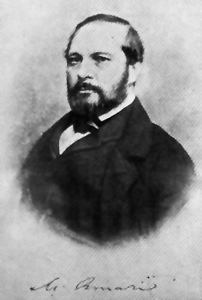
Michele Benedetto Gaetano Amari was a Sicilian patriot, liberal revolutionary and politician of aristocratic background, historian and orientalist. He rose to prominence as a champion of Sicilian independence from the Neapolitan Bourbon rule when he published his history of the War of the Sicilian Vespers in 1842. He was a minister in the Sicilian revolutionary government of 1848–9 and in Garibaldi's revolutionary cabinet in Sicily in 1860. Having embraced the cause of Italian unification, he helped prepare the annexation of Sicily by the Kingdom of Sardinia and was active in his later years as a senator of the Kingdom of Italy.

The Expedition of the Thousand was an event of the unification of Italy that took place in 1860. A corps of volunteers led by Giuseppe Garibaldi sailed from Quarto al Mare near Genoa and landed in Marsala, Sicily, in order to conquer the Kingdom of the Two Sicilies, ruled by the Spanish House of Bourbon-Two Sicilies. The name of the expedition derives from the initial number of participants, which was around 1,000 people.

The Sicilian revolution of independence of 1848 which commenced on 12 January 1848 was the first of the numerous Revolutions of 1848 which swept acrosss Europe. It was a popular rebellion against the rule of Ferdinand II of the House of Bourbon, King of the Two Sicilies. Three revolutions against the Bourbon ruled Kingdom of the Two Sicilies had previously occurred on the island of Sicily starting from 1800: this final one resulted in an independent state which survived for 16 months. The Sicilian Constitution of 1848 which survived the 16 months was advanced for its time in liberal democratic terms, as was the proposal of a unified Italian confederation of states. It was in effect a curtain-raiser to the end of the Bourbon kingdom of the Two Sicilies, finally completed by Giuseppe Garibaldi's Expedition of the Thousand in 1860, the Siege of Gaeta of 1860–1861 and the proclamation of the unified Kingdom of Italy.
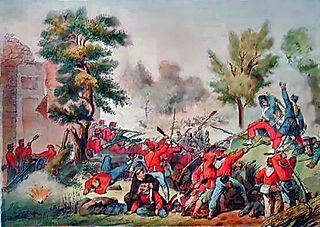
The Battle of the Volturno refers to a series of military clashes between Giuseppe Garibaldi's volunteers and the troops of the Kingdom of Two Sicilies occurring around the River Volturno, between the cities of Capua and Caserta in northern Campania, in September and October 1860. The main battle took place on 1 October 1860 between 30,000 Garibaldines and 25,000 Bourbon troops (Neapolitans).
Giuseppe Borrello (1820–1894) was an Italian poet, who wrote mainly in Sicilian, and was an Italian patriot.
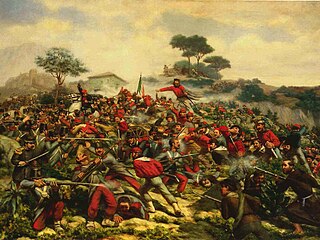
The Battle of Calatafimi was fought on the 15 May 1860 between Giuseppe Garibaldi's Redshirts and the troops of the Kingdom of the Two Sicilies at Calatafimi, Sicily, as part of the Expedition of the Thousand. The battle was the first of Garibaldi's victory during his invasion of Sicily in 1860 and saw his 'Thousand' defeat a larger Neapolitan army sent from Palermo to block the roads to the Sicilian capital.

Giustino Fortunato, also known as Giustino Fortunato senior was an Italian magistrate and politician. His nephew was the Italian historian and politician Giustino Fortunato (1848-1932).

The Dictatorship of Garibaldi or Dictatorial Government of Sicily was the provisional executive that Giuseppe Garibaldi appointed to govern the territory of Sicily during the Expedition of the Thousand in 1860. It governed in opposition to the Bourbons of Naples.

Giuseppe Natoli Gongora di Scaliti was an Italian lawyer and politician from the Mediterranean island of Sicily. He was Minister of Agriculture under Camillo Benso, Count of Cavour, in the first government of the Kingdom of Italy after unification in 1861.
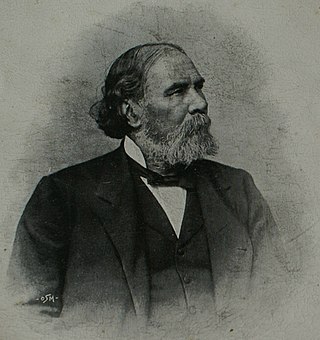
Domenico Menotti Garibaldi was an Italian soldier and politician who was the eldest son of Giuseppe Garibaldi and Anita Garibaldi. He fought in the Second and Third wars of Italian Unification, and organized the Garibaldi Legion, a unit of Italian volunteers who fought for Polish independence in the January Uprising of 1863. He also served in the Chamber of Deputies.

Giacinto Carini was a politician and Italian patriot. He participated in the Sicilian independence revolution of 1848, was a Garibaldian, a general, and a member of Parliament.
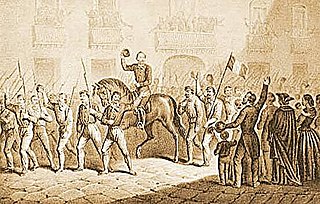
The Southern Army was the force of around 50,000 Italian and foreign volunteers which formed as a result of the Expedition of the Thousand. The name was coined by Giuseppe Garibaldi.

The siege of Palermo took place between 27 and 30 May 1860 in Palermo, Sicily, during the Expedition of the Thousand led by Giuseppe Garibaldi against the Kingdom of the Two Sicilies, as part of the Italian unification wars.

Francesco Landi was a Brigadier General from the Kingdom of the Two Sicilies. He was the main commander at the Battle of Calatafimi against Garibaldi's Redshirts during the Expedition of the Thousand.

Alessandro Nunziante, Duke of Mignano, was an Italian general and politician of the Kingdom of the Two Sicilies, and, from 1861, the Kingdom of Italy.
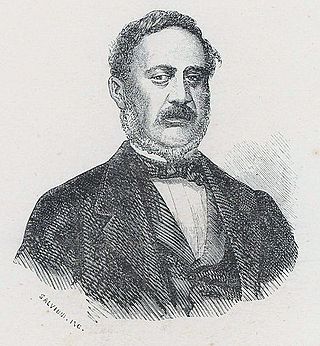
Filippo Cordova was an Italian patriot, jurist and politician.
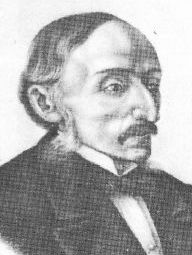
Matteo Raeli was an Italian patriot, jurist and politician. As Minister of Justice of the Kingdom of Italy he was responsible for the Law of Guarantees.

Giuseppe Salvatore Pianell was an Italian general and politician. Count since 1856.



















